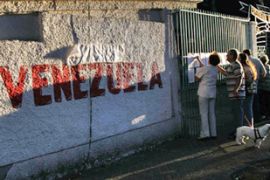Polls open in Venezuela referendum
Chavez seeks more powers through change in constitution, but vote is too close to call.

The US remains the number one buyer of Venezuelan oil.
Opponents, including Roman Catholic leaders, press freedom groups, human-rights groups and prominent business leaders, fear the changes would grant Chavez unchecked power and threaten basic rights.
At the very least, they would grant Chavez direct control over the central bank, allow his government to detain citizens without charge during a state of emergency, and empower the president to redraw the country’s political map and handpick provincial and municipal leaders.
Other proposed changes – such as shortening the workday from eight hours to six, creating a social security fund for millions of informal labourers and promoting communal councils where residents decide how to spend government funds – have been welcomed by supporters.
While the government has touted polls showing Chavez ahead, other surveys cited by the opposition have indicated strong resistance, which would present a challenge for a leader who won re-election last year with 63 per cent of the vote.
| In Video |
Lucia Newman, Al Jazeera’s correspondent in Venezuela, said: “If approved, these constitutional reforms will not only eliminate presidential term limits, but they would also give president Chavez enough power to transform the political, enconomic and social structure of Venezuela into what he calls a truly socialst, revolutionary state.
“There are a lot of people, even those who have traditionally supported president Chavez, who fear he may be going too fast too far.”
‘Close’ vote
Luis Vicente Leon, a pollster, said tracking polls by his firm Datanalisis in the past week show the vote is too close to predict.
Which side wins will depend largely on turnout among Chavez’s supporters and opponents, he said.
|
Your Views |
|
“Chavez is a very popular president still and he is counting on his own personal appeal to get the vote out in his favour” |
“If he wins by a very small margin, that’s a scenario filled with conflict,” Leon said.
“In a country where there are high levels of mistrust between the camps, it’s obvious the opposition … would think it was fraud.”
The opposition has called for close monitoring of the results, raising tensions before a vote on changes that would extend presidential terms from six to seven years, create new forms of communal property, and let Chavez seek re-election in 2012 and beyond.
About 100 electoral observers from 39 countries in Latin America, Europe and the US are on hand, plus hundreds of Venezuelan observers, the National Electoral Council said.
Chavez has accused his opponents of plotting to discredit the legitimate results of what he says will be a “knockout” at the polls, saying his enemies enjoy support from Washington.
Manuel Rosales, a Venezuelan opposition leader and the governor of Zulia state, recalled before a crowd of supporters on Friday night that he conceded defeat in the 2006 presidential race and urged Chavez to do the same and “recognise the will of the people”.
Spanish threat
On Saturday, Chavez lashed out at Spain, threatening to seize Venezuela’s Spanish-owned banks, unless the Spanish king apologises for telling him to “shut up” earlier this month.
“Spanish companies go away, we really don’t need them,” he said during a news conference at the presidential palace.
 |
| The United States is the number one buyer of Venezuelan oil [AFP] |
Some 140,000 soldiers and reservists were to be posted to maintain security during the vote, the defence ministry said.
Tensions have escalated in recent weeks, with university students lead protests and at times clashed with police and Chavista groups.
On Monday, one man was shot dead while trying to get through a road blocked by protesters.
Chavez, who has become Latin America’s most outspoken antagonist of Washington since he was elected in 1998, has sought to capitalise on his personal popularity ahead of the vote.
He is seen by many supporters as a champion of the poor who has redistributed more oil wealth than any other leader in memory.
